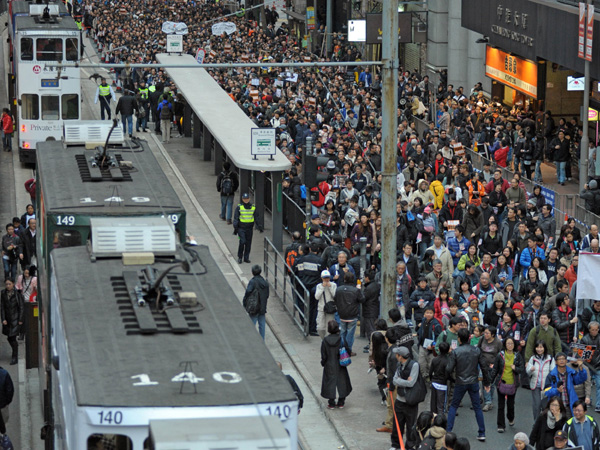
Thousands of pro-democracy protesters take to the streets calling for new Hong Kong Chief Executive Leung Chun-ying to step down in Hong Kong on January 1, 2013. Organisers have said they expected 50,000 people to join the New Year’s Day march against Leung Chun-ying, while pro-government groups staged separate and smaller rallies in support of the Beijing-backed chief executive. AFP / RICHARD A. BROOKS
HONG KONG— Tens of thousands of people marched in Hong Kong on the first day of 2013 to call for the city’s Beijing-backed leader to step down over allegations he was untruthful about illegal renovations at his mansion and to press for full democracy.
Police said 26,000 people joined the march at its peak Tuesday while organizers said 130,000 took part.
They carried banners and chanted slogans urging the leader, Leung Chun-ying, to resign. Some held signs depicting Leung as Pinocchio or with wolf-like fangs, a play on Leung’s nickname, the wolf. One demonstrator was dressed as a wolf wearing a Communist Red Guard uniform, a reference to fears over Leung’s close ties to China’s leaders. Many waved Hong Kong’s British colonial-era flag.
In the evening, about 2,500 members of a small radical group briefly blocked several roads after they were stopped by authorities from marching to Leung’s official government residence. At one point, protesters pushed and shoved with police.
In a sign of the widening political divisions in the semiautonomous region 15 years after Britain handed control back to China, thousands of other Hong Kongers joined a rival march held in support of Leung on the same day by pro-government groups. Organizers of that march said 60,000 people took part while police put the number at 8,000.
The day of protest comes half a year after Leung took office after being chosen by a 1,193-member committee of mostly pro-Beijing elites. Leung won the job of Hong Kong’s leader, known as the chief executive, after a scandal over a huge, illegal basement brought down his rival.
But illegal structures were later discovered at Leung’s house, prompting lawmakers to accuse him of covering it up and calling for his impeachment. Demonstrators are using the controversy to push for full democracy for Hong Kong.
Leung’s popularity has plunged since he took office because of the scandal over his house and other controversies.
Leung “is not honest. As chief executive, he cannot convince the public that he is a leader with credibility,” said Sandy Chung, a clerk. “I don’t want Hong Kong to be led by a person without credibility.”
Another protester, designer Calvin Tse, said he was upset that he didn’t have a say in choosing the city’s leader.
“We don’t even have a vote, he is elected by a small group of people. We cannot use our voting right to express our view no matter how his performance is,” Tse said.
Hong Kong was handed back to China in 1997 and granted Western-style civil liberties not seen on mainland China. Beijing has pledged that Hong Kong’s leader can be directly elected by 2017. Full democracy for the legislature, where some representatives are chosen by business groups, is promised for 2020.